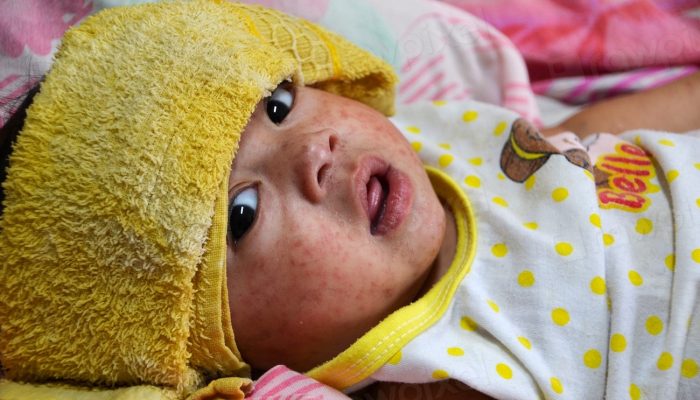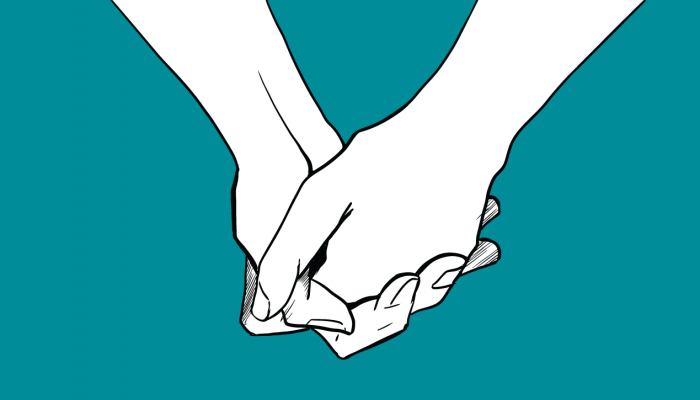Measles is a serious and highly contagious virus that continues to impact communities in and around Philadelphia. This FAQ addresses common questions about exposure, symptoms, protection, and what to do if you or your family may be at risk.
For the most current updates on measles in and around Philadelphia, visit phila.gov/measles.
Click on a topic for more information:
- General information
- People at Risk
- How it Spreads
- Symptoms
- Contagious Period
- Prevention
- Vaccines
- Treatment
- Travel
General information
What is measles?
Measles (also called rubeola) is one of the most contagious respiratory viruses. It spreads through the air and can be very serious, especially in babies and young children.
Why is measles so dangerous?
Measles is one of the most contagious diseases in the world and can cause severe health issues:
- 9 out of 10 people who aren’t protected and are exposed to measles can get sick.
- 1 out of 5 unvaccinated people in the U.S. with measles are hospitalized.
- Measles complications can be severe, especially for children:
- 1 out of 20 children develops pneumonia, the most common cause of death from measles in young children.
- About 1 out of 1,000 children with measles develop brain swelling.
- Pregnant people who aren’t vaccinated are at higher risk for preterm birth or low-birth-weight babies.
- Even with the best care, 1 to 3 out of 1,000 children with measles will die from severe illness.
Why are we seeing more measles outbreaks in the U.S.?
Even though measles is rare in the U.S. and the country technically eliminated it in the year 2000, we’re seeing more cases because fewer people are getting vaccinated, and global measles activity is increasing. This means there are more chances for unvaccinated people traveling to other countries to get infected with measles and bring it back to the U.S.
The measles-mumps-rubella (MMR) vaccine is the #1 way to prevent more measles outbreaks. However, at least 95% of the population needs to be immune to reach community protection (also called “herd immunity” or “community immunity”). Last school year’s (2023-2024) vaccination rate for Kindergarteners nationwide (the age when children should have finished both MMR vaccine doses) was less than 93%. Only 11 states had vaccination rates above 95%. Less vaccine coverage and more vaccine exemptions mean a higher chance of measles exposures and outbreaks.
Are we protected against measles in Philadelphia?
Philadelphia has high vaccination rates against measles. During the 2023-2024 school year, 94.5% of children were fully vaccinated (received 2 doses) by age 6, and that percentage is climbing.
People at Risk
Am I at risk of getting measles?
Measles is most dangerous for people who aren’t immune, including:
- Babies under 1 year old
- Unvaccinated children
- Unvaccinated pregnant people
- People with weakened immune systems (such as those undergoing cancer treatment, with untreated HIV, or taking immune-suppressing medications)
About 90% of unvaccinated people who have close contact with an infected person will get measles.
While at least 94.5% of children in Philadelphia are vaccinated against measles by age 6, more measles cases in the region put our communities at risk.
How it Spreads
Measles spreads through the air when an infected person coughs, sneezes, or talks. The virus can stay in the air for up to 2 hours after an infected person leaves.
People with measles can spread the virus from 4 days before to 4 days after the classic measles rash appears. Even a short exposure to an infected person can spread measles.
What should I do if I was exposed to measles?
It depends on whether you’re immune to measles. Being immune means you’re protected against the virus.
- If you’re IMMUNE, you don’t have to do anything.
To see if you’re immune, jump to the question “Am I protected (immune) against measles?” If you do get sick, stay home and call your doctor. Let them know you were exposed to measles.
- If you’re NOT immune:
- Call your healthcare provider or pediatrician ASAP
- You may qualify for post-exposure vaccination or medicine, which can help prevent measles.
- Ask them to call the health department.
- Stay home (quarantine) and monitor your symptoms for 21 days. Avoid contact with others, especially if they’re unvaccinated or have a weakened immune system.
- If you or your child feels sick, you should see a doctor. CALL AHEAD before visiting a clinic or hospital. Because measles spreads easily, they may take special steps to protect other patients and staff.
- If you’re NOT SURE if you’re immune:
- Ask your healthcare provider or pediatrician to check your vaccine records or, if still unsure, do a blood test.
- Also, tell them if you or your child feels sick.
- Stay home until your status is confirmed. If you must be around others, wear a mask in indoor public spaces and around unvaccinated people.
Symptoms
What are the symptoms?
Measles symptoms develop in stages and usually appear 7-14 days after exposure:
Early symptoms
- High fever
- Cough
- Runny nose
- Red, watery eyes
Later symptoms (2-5 days after symptoms start)
- Tiny white spots inside the mouth (Koplik spots)
- Measles rash, which usually starts as flat spots on the face, then spreads down the body
- High fever that spikes when the rash appears
Rash on different skin tones
- On lighter skin, the rash can appear red
- On darker skin, it may look purple or darker than the surrounding skin
Common complications
- Ear infections (1 in 10 cases)
- Diarrhea (less than 1 in 10 cases)
Contagious Period
A person with measles typically develops a rash and is contagious from 4 days before to 4 days after the rash appears. The rash usually starts as flat spots on their face and then spreads down the body.
Prevention
Am I protected (immune) against measles?
You’re immune, or protected, against measles if you don’t have a weakened immune system and meet one of the following:
- Received 1-2 doses* of MMR vaccine.
- Have a blood test showing immunity to measles.
- Born before 1957 (at least 68 years old by 2025).
- Have documentation of a past measles infection.
*Received just 1 dose of MMR vaccine? You’re still protected against measles. However, if you were exposed to measles, you may need a second vaccine dose.
If you’re not immune against measles, you should get vaccinated right away.
For vaccine recommendations, jump to the question “Can I get a measles vaccine?”
Why are adults born before 1957 considered protected against measles?
Almost everyone born before 1957 (at least 68 years old by 2025) got measles as a child since there was no widely available vaccine. Once you get measles, it protects you from future infection.
However, getting measles now isn’t a good or safe way to be protected against future measles outbreaks. When children before 1957 were getting sick with measles, many of them suffered. Each year:
- 400 to 500 people died
- 48,000 were hospitalized
- 1,000 had encephalitis (brain swelling), sometimes leading to long-term disability
If you’re born after 1957 and aren’t vaccinated, choosing to get the MMR vaccine is the #1 way to prevent measles.
How can I protect myself or my child from getting measles?
You’re well protected if you’re immune to measles. To find out if you’re immune, see Prevention.
However, if you’re not immune, the best way to protect yourself or your child is to get vaccinated. The MMR vaccine (measles, mumps, rubella) is 97% effective at preventing measles when two doses are given. One dose is 93% effective.
Did you know? Before the vaccine became widely available, measles outbreaks would kill over 2.6 million people each year around the world. The MMR vaccine has been safely used for decades and saves lives.
Does Vitamin A prevent measles?
No. Vitamin A does NOT prevent measles. Only the MMR vaccine can prevent a future measles infection.
Vitamin A is often part of measles treatment for children. It doesn’t cure measles, but it’s been shown to reduce the risk of health complications and dying. Vitamin A treatment is done under the supervision of a healthcare provider, not at home.
Taking large amounts of Vitamin A when it’s not needed can be toxic. It can cause liver injury, osteoporosis, brain swelling and ski disease.
Vaccines
Does the vaccine really work?
Yes! The MMR vaccine provides lifelong protection and is:
- 93% effective with 1 dose
- 97% effective with 2 doses
Choosing to get the MMR vaccine is the only way to prevent a future measles infection!
Can I get a measles vaccine?
If you’re not immune to measles, you should get vaccinated. To find out if you’re immune, see Prevention.
Also, if you or someone you’re traveling with is going out of the country or to any place in the U.S. with a measles outbreak, get vaccinated at least 2 weeks before travel if you or your travel partner is a/an:
- Infant 6-12 months old (they’ll still get their routine 2 doses for kids).
- Child at least 1 year old who hasn’t received their second dose.
- Adult with only one dose and no test results that show immunity to measles.
When do kids normally get vaccinated against measles?
Kids get two doses of the MMR (measles-mumps-rubella) vaccine:
- 1st dose between 12-15 months old
- 2nd dose between 4-6 years old
This is the routine vaccine schedule for kids. If your child is behind on their doses, it’s not too late to get caught up! Remember, choosing to get the MMR vaccine is the best way to protect your child from this dangerous disease.
I heard there was a measles case in my area. Can I get another dose of the measles vaccine?
If you’ve already received 2 doses of the MMR (measles-mumps-rubella) vaccine you don’t need to get more. Two doses are very effective and offer lifelong protection.
Where can I get vaccinated?
MMR vaccines are usually available at:
- Your healthcare provider’s office
- Retail pharmacies (for adults with insurance)
- City Health Centers (free for all Philadelphia residents).
Are measles vaccination rates dropping?
The vaccination rate nationwide is dropping. However, the vaccination rate in Philadelphia is increasing. We usually look at how many Kindergarteners have received both MMR vaccine doses to measure vaccination rates:
- Nationwide, rates were highest the school year before the COVID pandemic hit (95.2% during 2019-2020), then began dropping during the pandemic. Since then, MMR vaccinations ranged between 93.9% and 92.7%.
- Philadelphia also saw a similar trend when the pandemic started, but it’s been climbing up since the 2022-2023 school year. Last school year (2023-2024), 94.5% of Kindergarteners were vaccinated, and we think it’ll be even higher at the end of this school year (2024-2025).
Treatment
What should I do if I think I have measles?
Immediately call your healthcare provider and follow recommendations from your local health department. Tell your provider about your symptoms so they can tell you what to do next. Call before going to an emergency department, urgent care, or other healthcare facility before calling first, so you don’t put others at risk of getting measles.
In general:
- Stay home for four days after you develop the rash.
- Cover your mouth and nose with a tissue when you cough or sneeze, and put your used tissue in the trash can. If you don’t have a tissue, cough or sneeze into your upper sleeve or elbow, not your hands.
- Wash your hands often with soap and water.
- Avoid sharing drinks or eating utensils.
- Disinfect frequently touched surfaces, such as toys, doorknobs, tables, and counters. Standard household disinfectants will readily kill the measles virus.
Is there any treatment for measles?
Some people who are exposed may be able to get treatment to prevent measles from developing. There’s no specific antiviral therapy for measles, but people may receive supportive care and other medicines to address complications. Talk to your provider if you have questions or concerns.
Does Vitamin A treat measles?
Vitamin A is often part of measles treatment for children. It doesn’t cure measles, but it’s been shown to reduce their chance of health complications and dying. Vitamin A treatment is done under the supervision of a healthcare provider, not at home.
Vitamin A does NOT prevent measles. Only the MMR vaccine can prevent a future measles infection.
Travel
Do I need to take any precautions if I’m traveling?
Make sure you and anyone you’re traveling with are protected (immune) against measles before you go on your trip. This is especially important if you’re visiting a place in the U.S. that currently has a measles outbreak in the U.S. or going anywhere out of the country. If you aren’t protected (immune) against measles, get vaccinated at least 2 weeks before you travel. This includes:
- Infants 6-12 months old (they’ll still get their routine 2 doses for kids).
- Children at least 1 year old who haven’t received their second dose.
- Adults with only one dose and no test results that show immunity to measles.
Additional Resources
When and where to get a measles vaccine
Flyers (available in multiple languages):
- What is measles?
- General measles information
- Measles vaccine
- Traveling & measles
- For parents and caregivers
- For early childhood centers




